What do you do when you can't hear the whistle in
Gamblers?
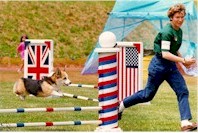 Mary-Elizabeth
Simpson's parents were not aware that she had a hearing problem until she was about three years
old. She never learned to use sign language and was mainstreamed all her life. She learned to
take the ups and downs of being a deaf child in a hearing world. The road was fraught with
anger, isolation, and wanting to be independent. Everyone's love in the family was no match for
the love that her dogs gave to her. Mary-Elizabeth
Simpson's parents were not aware that she had a hearing problem until she was about three years
old. She never learned to use sign language and was mainstreamed all her life. She learned to
take the ups and downs of being a deaf child in a hearing world. The road was fraught with
anger, isolation, and wanting to be independent. Everyone's love in the family was no match for
the love that her dogs gave to her.
My grandmother was the saving grace to all my needs and
my parents tried in every way to make life easier for me. Once their suspicions were confirmed
about my hearing, they sent me to a local hospital where I took speech therapy and learned to
lip read. There I strengthened my pronunciation of words. I went on to college where I studied
sociology.
After I graduated, I was determined to change my
lifestyle and become something. But what? I couldn't hear. Employers didn't want a deaf person
on their payroll - and if they had me, I was in the lowest paid position. My biggest challenge,
however, was overcoming my shyness. All my life I was over-protected. I spent my time with
adults but didn't have friends my age. Why? Because I couldn't hear on the phone to chat,
couldn't hear in the dark, and many didn't want to include me for fear that I wouldn't have any
fun or understand conversations in large groups.
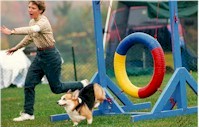 Tasha
changed my life Tasha
changed my life
Things changed when Windcrest's Sheer Delight,
CDX, NA, CGC (Tasha) arrived. She was from my very first litter and was born outside in a bed
of pachysandras. At that time I didn't realize the impact she would have on my life.
We took obedience classes at Portchester Obedience
Training Club and started earning titles in obedience. A year later, I become their instructor
once a week. I was thrilled to. Then a few years later, I started Joyful Canine Training which
caters in helping people train their dogs on a private basis.
I started agility at Portchester OTC and then at Contact
Agility Club. I was hooked! Tasha and I became inseparable. We would go to AKC and USDAA trials
and would have fabulous runs only to be NQ'd because she would knock only one bar down. This
became my ultimate challenge. I was determined to overcome it so I sought help from many people
but especially from Elisha Calhoun. She suggested getting her thinner, doing
cavalettis, running up hills and doing series of jumps of varying heights in sequences. We did
all that and, lo and behold, she got her NA title!!
Gamblers is my goal
It had taken three years, and those who know us
know how we've struggled. All this time I've avoided doing Gamblers as I knew I wouldn't be
able to hear the whistle and didn't want to make a fool of myself. But technology has come to
the rescue. There are small devices on the market capable of sending a signal to the handler
when the whistle blows or, in this case, it vibrates when the judge presses the device to
signal that time is up! It can be ordered from a few telephone stores or specialist catalogues
for deaf/hard of hearing people.
I will soon be doing that and hope to succeed in that
area. My goal is to go to the Grand Prix Finals. It probably will take a year or two, but after
all I've had to overcome all these years to get to where I am today, I'm sure I can wait until
the time comes when I will be able to compete in the finals!
Below are a few links that you can go
to if you are interested in special devices to help you on the agility course, at work or even
at home.
They include:-
Silent Call has no web page, but
they can be contacted at
Silent Call Communications
P.O. Box 868 Clarkston, Michigan 48347-0868 USA
V/TT: 1-800-572-5227 fax: 248-673-5442.
A great reference pages for all
agility needs!
http://www.dogpatch.org
About the author...
Mary-Elizabeth Simpson is a deaf handler, trainer, and breeder. Her love of dogs started
at age seven when the family got a Pembroke Welsh Corgi (PWC). She's enjoyed some success in
the Obedience and Agility ring with her first Pembroke Welsh Corgi and has been extremely
successful in helping people train their dogs and getting them started in obedience
competitions.
She now has two dogs in training, an Aussie Wessel
(Montrose Special Edition) and another PWC, Hannah Banana (Windcrest Zip'n' Rave Review, NA,
NAJ, CGC) which I hope to title further than my first one.
Mary-Elizabeth can be contacted at Joyful Canine
Training/Windcrest Acres on
simcorgi@aol.com
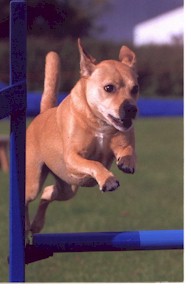 From
Helen Walland... From
Helen Walland...
With regard to the article on deaf
handlers Americans seem to have it a lot easier than us.
I am registered disabled as I have lost about 40% of my
hearing in both ears. I wear two hearing aids but still manage - just- to teach full time in a
primary school. Because I can hold an intelligent conversation on a one to one basis using all
my concentration, people tend not to treat me any differently to other handlers. In fact, I
have had more people making a joke out of my deafness in Agility situations than any where
else.
I'm afraid British Agility is not at all 'PC'.
-
There is no way of knowing what is going on at a
show unless you can hear the PA system. Even people with good hearing have problems
with this.
-
Handlers rarely, in my experience, tell their
dogs to stop barking while they try to have a conversation with me.
-
Although I tell as many people as I can that I
have trouble hearing, there are no allowances made.
Thank goodness we don’t have many tables in Midis, I have
to rely on lip-reading for the count.
I never hear what a judge says to me on a course as they
are out of range of my hearing aids. I usually rely on other people in the line explaining to
me. (Like -You are E’d because you left your bum bag on!)
This is something that everyone needs to understand.
Glasses correct eye sight. Hearing aids do not correct hearing defect. All a hearing aid does
is to amplify all sound (including barking dogs) within a radius of about four feet. Outside
that range they are completely useless.
What show organisers can do to help us would probably
also help hearing handlers.
-
Always put ring numbers high enough and large enough to be
read from a distance, preferably numbered both sides of the board.
-
Try very hard to make a distinction in announcements
between Midi and Mini – which sound very alike
-
Allow deaf handlers lots of leeway about running order
-
If you know you’ve got a deaf handler helping on a ring,
it would be great if you had time to radio that ring when her courses were going to be
walked.
I find shows very stressful because of my disability,
although I love to compete and Kiri and I are having some success at the moment. I am always on
tenterhooks in case I miss walking the courses - which I often do.
I’m thinking of wearing a badge at the next show ‘Deaf
Handler - Please let me know if you hear a Midi course being walked.'
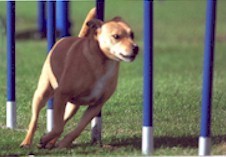 The other deaf handler I
know is profoundly deaf, which means she hears very little indeed. She brings her mum to shows
to act as her ears. A simple solution if you have a relative around. The other deaf handler I
know is profoundly deaf, which means she hears very little indeed. She brings her mum to shows
to act as her ears. A simple solution if you have a relative around.
One last plea –
Please, please, if someone says 'I’m sorry could you repeat that, I’m deaf.'
DON’T reply, 'Pardon!'
This is not funny, and we’ve all lip-read it dozens of
times before! (08/10/01)
From Charlotte Graves, Corgi
Owner...
I think that Mary-Beth Simpson's article on endurance is
marvelous. She runs the pace as hard as her dogs. She is an inspiration. I enjoyed reading this
piece. (24/02/01)
Some observations from Terry
Blonder Golson, another handler with severe hear loss...
The biggest issues for me as a person, not deaf but with a severe
hearing loss, are hearing the table count and picking up comments by a judge or ring crew.
I'm careful at the start to let the gate steward know I
won't be able to hear them call my name. I make sure that I know what the whistle sounds like
(once there was a plastic child's whistle, total disaster -- no one could hear it).
I do get nervous during Gamblers that I won't be able to
hear the whistle signaling when to start the gamble, though that has only happened once. Also,
I wish that trials would have whistles that sound different for each ring, as I can't always
hear what direction a sound is coming from.
I always ask the judge where they will be standing while
doing the table count. I also ask them to show me how they count so that I can tell whether
they'll have to talk louder, or whether I can read their body language. I prefer not to have
them count louder as that tends to slow them down, and I have a history of missing Q's by 1
second.
During the judge's briefing, I come across as quite rude
and squeeze my way past people, so I can stand next to the judge and hear. Of course, I miss
all of what comes over the loudspeakers. But, I am a member of an agility club, so I sit with
people who help me out.
I do have an extra level of anxiety as a competitor as
I'm afraid I won't hear the stray comment, am concerned I'll miss the announcement about a
class starting or worried about the table count, etc. As time goes on, I am less anxious as I
know much more as to what to expect. Also, in New England I recognize many of the competitors,
and since it is a small, helpful community, I can ask for assistance when needed.
From Megan McDowell...
I am so glad to see someone with an interest in deaf handlers. My
nine year old niece Brinna runs her dog in agility and is learning very quickly. She loves her
dogs and horses.
We are in California and have had a terrible luck finding
a trainer who can deal with the hearing impaired. What has worked the best is providing the
instructor with the book Sign for Me from Dawn Sign Press. This is VERY basic book, but
the signs are clear and concise.
Out of necessityI am becoming quite the agility
instructor out of necessity. We have a full set of home made equipment now, and I take lessons
so I can explain techniques to her. I recently purchased a set of vibrating beepers to help get
my niece's attention when she is out if my line of sight, and spotters are allowed ringside.
She also shows horses and has no problem making her desires known.
Brinna has competed in two trials this season earning a
Novice Gambler leg and a JH Standard leg. I bought vibrating beepers to help her in the Gambler
class. The competitors here look on her as a bit of a novelty but for the most part have been
nice enough.
She speaks Signed English rather than ASL. The dog was
not taught sign; Brinna was taught DOG. If you really pay attention to what your BODY does when
you are teaching the signals are very clear and deaf people are tuned in to body language as
well as facial expression.
She is also having great success in the herding ring.
mostly due to the fact that she can hear a dog whistle but not the spoken word. The family has
been showing horses and dogs for many years and she has an AMAZING rapport with the animals,
almost like telepathy.
In fact, Brinna probably gets along better with the
animals than with people! We are considering a permanent move to Great Britain, so the interest
in deaf handling over there is a great relief. I will be happy to answer any questions you may
have or write something about our experiences if you wish.
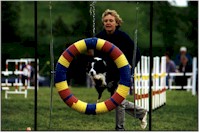 Thanks
for asking about hearing impaired handlers in agility... from Debbie Gifford Thanks
for asking about hearing impaired handlers in agility... from Debbie Gifford
I've been hearing impaired since I was about six years old.
I developed tonsillitis which caused a mild hearing loss in both my ears. That was supposed to
be the extent of my condition. However, life had something different in store for me. When I
reached the age of 16-17, my hearing loss increased to what it is today - severe to
profound. Fortunately, I speak well, have enough hearing to be able to benefit from the use
of two hearing aids and read lips well.
I started agility about three years ago with my Border
Collie Ramsey who is now 4 1/2 years old. We compete in NADAC (North American Dog Agility
Council) and AAC (Agility Association of Canada). At first, my biggest worry was whether or not
I would be able to hear the ring steward and starter when they called my name, or told me it
was time to start my run.
Learning to cope
What I do to overcome this anxiousness is
to check in ahead of time with the gate steward (a courtesy that should be extended by all
handlers), and memorise who is running in front of me. I make sure I am where I am supposed to
be in plenty of time. When the ring steward calls my name, my husband Jeff responds loudly with
'she is over here and she can't hear you.' His response not only informs the ring
steward but other exhibitors as well. When I walk into the ring, he then alerts the ring
personnel of my special needs. Most starters now let me know it is time to run with either a
nod of the head, or give a 'thumbs up' sign. Some places use a bell, so I have to look for that
ringing motion.
These factors allow me to concentrate more on Ramsey
before I enter the ring and at the start line. I think many competitors will tell you that
besides being 'in synch' on the course, it is also vital to make a 'connection' with your
canine partner before you start your run as well.
Assistive technology
Gamblers was also a concern of mine. As I
mentioned, I have a small amount of residual hearing and hence get some benefit from hearing
aids. I am therefore able to use an assistive listening device called an FM system when on the
course. My husband or I explain to the judge how it works.
Basically there are two small boxes. One is called the
receiver which I strap to my waist via an elasticized belt and the other is called the
transmitter which is placed near the sound (i.e. speaker's voice at work, or the whistle in
Gamblers competition). The receiver has a wire that connects up to both my hearing aids. My
husband holds the transmitter and it's associated microphone near the whistle. When the whistle
blows signifying the start of the gamble, the sound travels to my hearing aids via FM radio
waves. There have been a few situations where due to lots of wind or rain the FM signal has
been weak or non-existent, so as a backup when the first whistle blows, my husband speaks
loudly into the transmitter microphone the word 'Now! 'I can only remember one time out of 30
that this system hasn't worked. I also remember one other time where a judge wasn't going to
allow the FM system to be used because he felt that this practice gave me an unfair advantage
over my fellow competitors. After awhile he gave in, but did not allow my husband to be part of
the notifying process.
The table
The other spot I struggle is when there is the
table obstacle on the course. I have to guess when the table count is over. It is too
disruptive to the trial proceedings for me to stop everything and run out and give the judge
the transmitter/microphone part of the FM system. Instead, I ask if they can get as close to me
as they can and be in my line of sight so that I can read their lips or see their finger count.
Not an ideal solution, but it works. Now if I could only get Ramsey to go down immediately on
the darn table!
Thank you Anette
I train with a great instructor in Canada named
Anette Hoegl. At our weekly training sessions, she always wears the FM system, so I can hear
her instructions/advice from far away. I attribute much of my and Ramsey's success - we are a
few jumpers leg short of NADAC's top award the NATCH title - to Annette's great advice and
support.
Photo of Debbie Gifford: Kevin Potvin
|